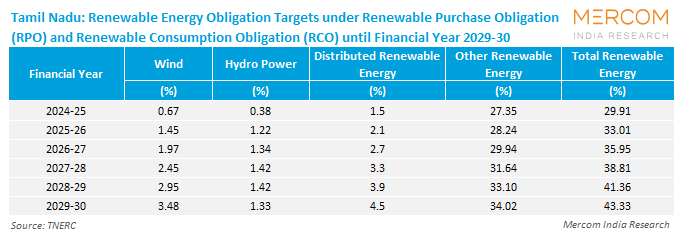Tamil Nadu Sets Renewable Purchase and Consumption Target of 43% by FY 2030
The Commission added distributed renewable energy component under the broader scope of renewables
October 15, 2025
Follow Mercom India on WhatsApp for exclusive updates on clean energy news and insights
The Tamil Nadu Electricity Regulatory Commission has set a target of meeting 43.33% of its energy requirements from renewable sources by the financial year (FY) 2030.
Wind component
The wind renewable energy component must be met through energy produced from wind projects commissioned after March 31, 2024.
Hydro component
The hydro renewable energy component must be met from hydropower projects, including pump storage projects and small hydro projects commissioned after March 31, 2024.
It may also be met from the free power provided to the state or power distribution licensee (DISCOM) from hydro power projects commissioned after March 31, 2024, or from hydro power projects located outside India, as approved by the central government on a case-by-case basis.
Distributed renewable energy component
The distributed renewable energy component must be met only through energy generated from projects that are less than 10 MW and should include solar installations under all configurations, such as net metering and gross metering, and other renewable energy sources as notified by the Commission from time to time.
Compliance will ordinarily be considered in terms of energy in kWh. If the designated consumer cannot provide generation data, the reported capacity will be adjusted to reflect distributed renewable energy generation using a multiplier of 4 kWh/kW/day.
If the generation data of prosumer installations is not available to the distribution companies (DISCOM), the generated units will be calculated using a multiplier of 4 kWh/day for the renewable purchase obligation (RPO) counting by the DISCOM.
Other renewable energy component
Other renewable energy may be met through energy produced from any renewable energy power project other than those of wind, hydro, and distributed renewable energy.
Any shortfall in meeting the stipulated wind renewable energy consumption in a particular year may be met with hydro renewable energy that is in excess of that energy component for that year, and vice versa.
The excess energy consumption from wind and hydro renewable energy sources can be considered part of other renewable energy.
Any excess energy generated from other renewable energy sources can be utilized to offset the shortfall in achieving the stipulated wind or hydro renewable energy consumption targets.
Open access consumers or captive power consumers should fulfill their obligation as per the specified total renewable energy target, irrespective of the non-fossil fuel source. The Bureau of Energy Efficiency or a state-designated agency will enforce the applicable provisions of the Energy Conservation Act 2001, including the minimum share of consumption of non-fossil sources by designated consumers.
The specified renewable energy consumption targets should be met either directly or through certificates in accordance with the Central Electricity Regulatory Commission Terms and Conditions for Renewable Energy Certificates for Renewable Energy Generation Regulations 2022 and amendments issued from time to time.
Any shortfall in specified renewable energy consumption targets will be treated as non-compliance, and the consequence of default will be as per Regulation 9.
Tamil Nadu State Load Despatch Center or Tamil Nadu Green Energy Corporation should maintain data related to compliance of renewable energy utilization by the obligated entities and submit a report to the Commission quarterly as per the format communicated by the Commission from time to time.
Amendment to Regulation 4
The Commission said that the renewable consumption obligation (RCO) notified by the Ministry of Power will apply to the obligated entities and designated consumers. However, the Commission may revise the RPO or RPO percentage and conditions, either on its own or on the recommendation of the state agency or DISCOM, considering state-specific issues. In such cases, the RPO or RCO prescribed by the Commission will prevail over the RCO prescribed by the Ministry of Power.
Amendment to Regulation 9
Through the amendment, the Commission allows an obligated entity to request permission to carry forward the compliance requirement to the next year in case of bona fide difficulty owing to the non-availability of certificates for consideration on merit.
The earlier clause stated that any obligated entity or designated consumer failing to comply with the obligation to purchase or consume the required percentage of power from renewable energy sources, or to purchase renewable energy certificates, would be liable for a penalty as decided by the Commission.
Subscribe to Mercom’s real-time Regulatory Updates to ensure you don’t miss any critical updates from the renewable industry.

